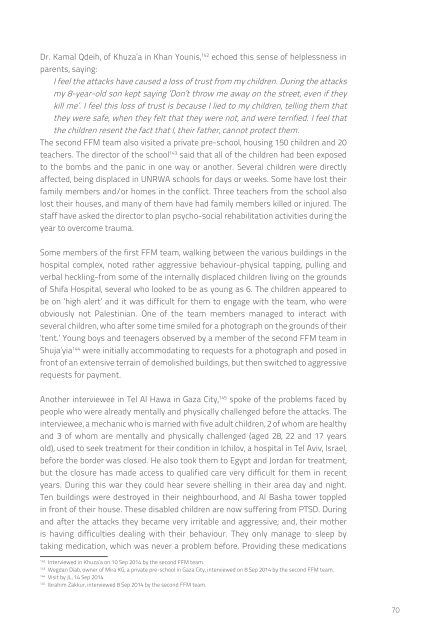HHo0s
HHo0s
HHo0s
You also want an ePaper? Increase the reach of your titles
YUMPU automatically turns print PDFs into web optimized ePapers that Google loves.
Dr. Kamal Qdeih, of Khuza’a in Khan Younis, 142 echoed this sense of helplessness inparents, saying:I feel the attacks have caused a loss of trust from my children. During the attacksmy 8-year-old son kept saying ‘Don’t throw me away on the street, even if theykill me’. I feel this loss of trust is because I lied to my children, telling them thatthey were safe, when they felt that they were not, and were terrified. I feel thatthe children resent the fact that I, their father, cannot protect them.The second FFM team also visited a private pre-school, housing 150 children and 20teachers. The director of the school 143 said that all of the children had been exposedto the bombs and the panic in one way or another. Several children were directlyaffected, being displaced in UNRWA schools for days or weeks. Some have lost theirfamily members and/or homes in the conflict. Three teachers from the school alsolost their houses, and many of them have had family members killed or injured. Thestaff have asked the director to plan psycho-social rehabilitation activities during theyear to overcome trauma.Some members of the first FFM team, walking between the various buildings in thehospital complex, noted rather aggressive behaviour-physical tapping, pulling andverbal heckling-from some of the internally displaced children living on the groundsof Shifa Hospital, several who looked to be as young as 6. The children appeared tobe on ‘high alert’ and it was difficult for them to engage with the team, who wereobviously not Palestinian. One of the team members managed to interact withseveral children, who after some time smiled for a photograph on the grounds of their‘tent.’ Young boys and teenagers observed by a member of the second FFM team inShuja’yia 144 were initially accommodating to requests for a photograph and posed infront of an extensive terrain of demolished buildings, but then switched to aggressiverequests for payment.Another interviewee in Tel Al Hawa in Gaza City, 145 spoke of the problems faced bypeople who were already mentally and physically challenged before the attacks. Theinterviewee, a mechanic who is married with five adult children, 2 of whom are healthyand 3 of whom are mentally and physically challenged (aged 28, 22 and 17 yearsold), used to seek treatment for their condition in Ichilov, a hospital in Tel Aviv, Israel,before the border was closed. He also took them to Egypt and Jordan for treatment,but the closure has made access to qualified care very difficult for them in recentyears. During this war they could hear severe shelling in their area day and night.Ten buildings were destroyed in their neighbourhood, and Al Basha tower toppledin front of their house. These disabled children are now suffering from PTSD. Duringand after the attacks they became very irritable and aggressive; and, their motheris having difficulties dealing with their behaviour. They only manage to sleep bytaking medication, which was never a problem before. Providing these medications142Interviewed in Khuza’a on 10 Sep 2014 by the second FFM team.143Wegdan Diab, owner of Mira KG, a private pre-school in Gaza City, interviewed on 8 Sep 2014 by the second FFM team.144Visit by JL, 14 Sep 2014145Ibrahim Zakkur, interviewed 8 Sep 2014 by the second FFM team.70


